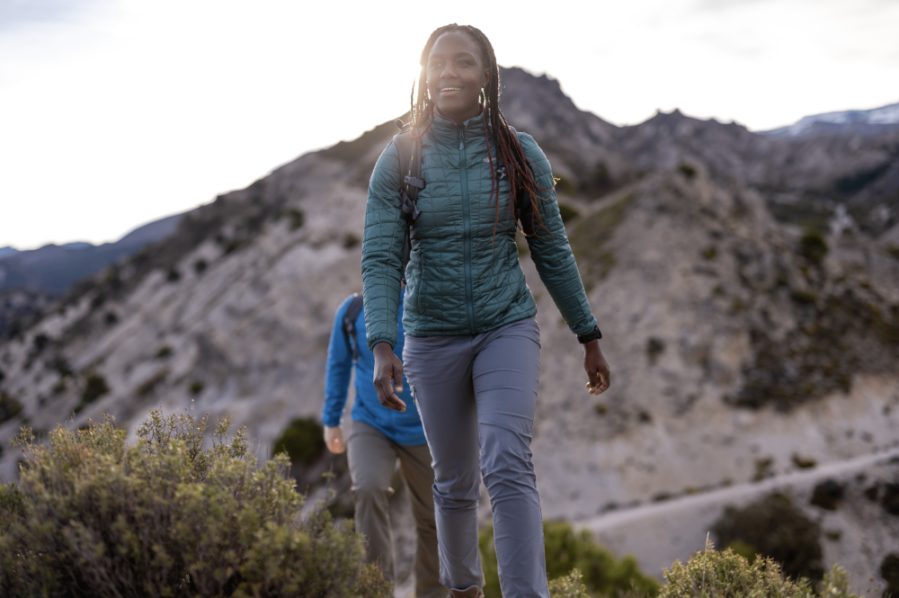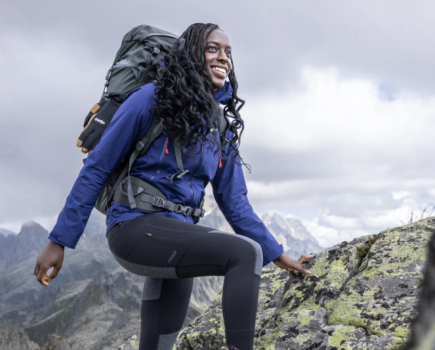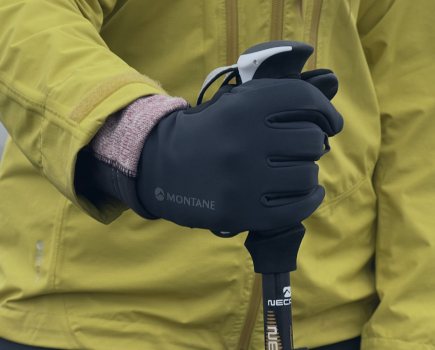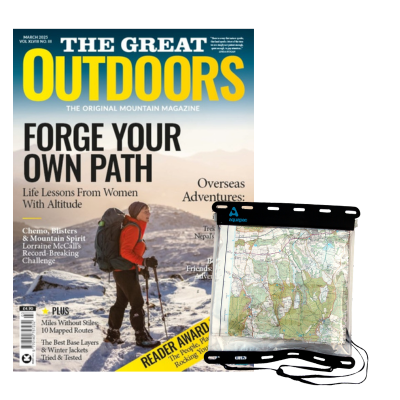The first thing to consider when selecting an insulated jacket to keep you warm in cold weather is whether you want natural or synthetic insulation. Natural insulation, typically in the form of down, is popular due to its warmth-to-weight ratio, but its Achilles heel is that it loses loft fast when exposed to damp. Synthetic insulation, on the other hand, will keep the wearer warm even if the jacket is wet – and occasionally even soaked through.
In places like the Pacific Northwest, Ireland or the UK, synthetic garments can be the best option as they remove the need to worry so much about keeping the materials dry. It’s worth bearing in mind that the same principles and cost-benefits between down and synthetic jackets also apply when choosing three-season sleeping bags.
The best insulated jackets
The following puffy jackets are the options that performed best for our testers, along with our Best Buy options. They are split into insulated jackets for men and insulated jackets for women looking at both synthetic and down insulation and rated for their performance, durability, feature set and value.
Berghaus Extrem MTN Seeker Synthetic Hoody
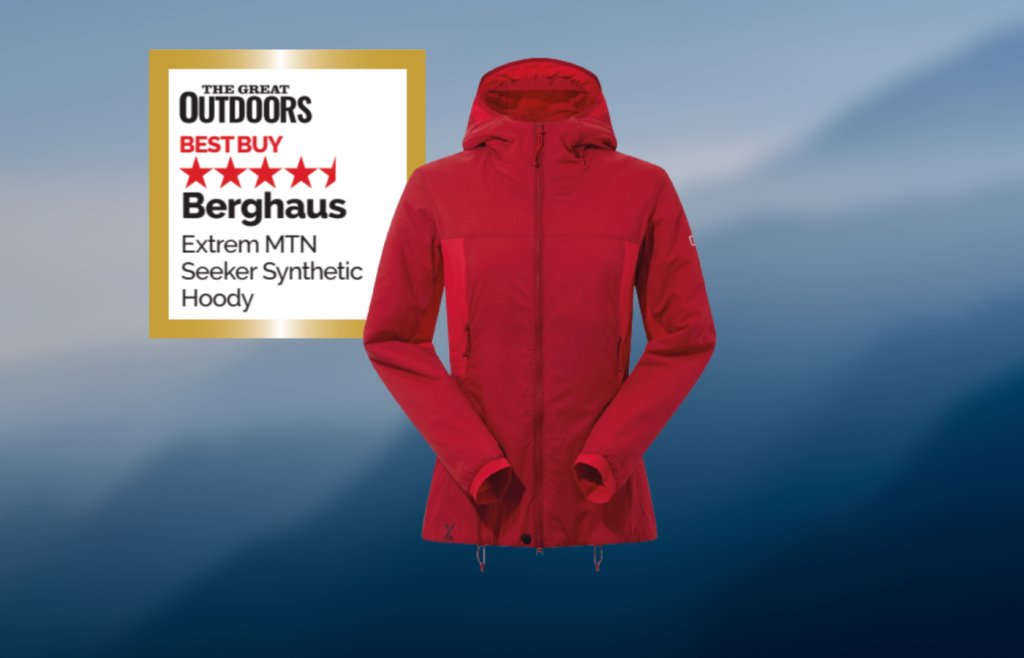
Kirsty Pallas’ Best in Test
The Berghaus Extrem MTN Seeker is an insulated jacket that I’ve struggled not to pack because it works so well for me- Good pocket placement
- Double zip
- Fit
- None
| Quick specs | |
|---|---|
| Price: U.S. shipping charge | £200 Weight: 318g Fill: 60gsm Primaloft Gold Active+ in main body and 40gsm underarms and centre back Shell: lightweight ripstop with PFC free DWR treatment Hood: elasticated with stiff wire peak and adjustable drawcord Cuffs: elasticated stretch material Hem: dual drawcord Pockets: 2 handwarmer, 1 internal chest, all zipped Sizes: UK 8-18 Men’s version: Yes |
The Berghaus Extrem MTN Seeker is an insulated jacket that I found versatile and comfortable for various activities. It is warm enough for stationary use but manageable when moving without overheating due to its zoned fill. The jacket is made with over 50% recycled content and features handwarmer pockets, an internal chest pocket, and a hood that can be worn over a helmet. The hood has a gaiter at the front and a drawcord adjustment for cinching in. The wired peak is flexible and was relatively easy for me to pack away.
The jacket also has a double zip for access to a harness loop and stretchy cuffs for a winter glove passage. The shell fabric is lightweight and ripstop, but the cuff fabric may bag over time. Despite this, the Berghaus Extrem MTN Seeker is the most versatile jacket I pack year-round. The features are well-thought-out, and the fit is neat for under a waterproof jacket, but still allows for layers underneath. Overall, the Berghaus Extrem MTN Seeker is a versatile and well-designed jacket that is perfect for any outdoor activity.
Read Kirsty’s full Berghaus Extrem MTN Seeker Synthetic Hoody review
Rab Xenair Light
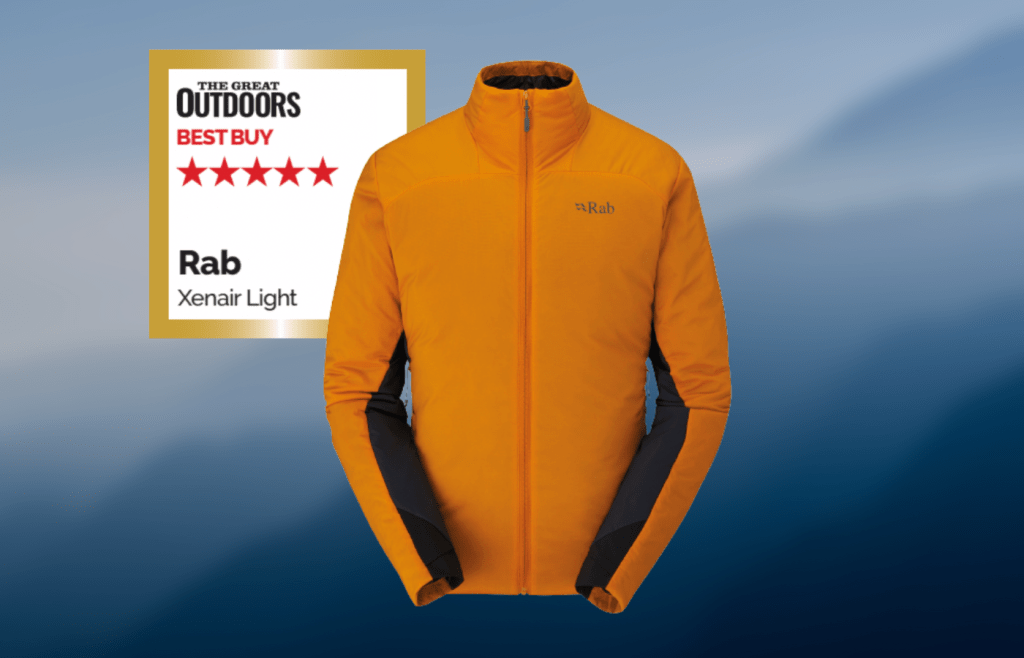
David Lintern’s Best in Test
In more extreme winter conditions, sandwiched between a hardshell and a fleece, this insulated jacket truly shines. It not only keeps me warm but also allows water vapor to escape the layering system.- Amount of insulation perfectly dialled
- Thumbloops
- None
| Quick specs | |
|---|---|
| Price: $195 | £170 Weight: 263g Fill: 40gsm PrimaLoft® Gold Active+, 55% recycled Shell: 20D Pertex® Quantum Air Hood: none Cuffs: none-elasticated, thumb-loops Hem: single drawcord Pockets: 2 handwarmer, 1 chest, all zippered Sizes: S-XL Women’s version: no (nearest is the Xenair alpine hoody, with 60gsm primaloft) |
The Rab Xenair Light is a highly effective active insulation layer, providing warmth with 40gsm of Primaloft Gold Active + and a significant percentage of recycled content. The shell is 20D Pertex, balancing breathability with durability. The DWR insulation system is durable even after multiple washes. The jacket maintains an even core temperature on its own over a baselayer in cool weather and can be sandwiched between a hardshell and a fleece in full on winter conditions.
The Xenair Light is rated 5/5 for its fit and features, including a single hem adjuster, one-way front zip, three zippered pockets, and two handwarmers. However, the lack of a hood in static insulation makes it easier to sit under a shell and with less wrestling. The sleeves are finished with thumbloops, keeping the chill off initially and snag-free when big gloves are on top.
Despite slight tailoring in the lower arm, the fabric has enough stretch to allow the sleeves to be pulled up to dump heat. The Rab Xenair Light is a goldilocks, no nonsense midlayer that can be worn all day in cooler months. It is made from premium materials and designed for start/stop activity, making it a top choice for active layering.
Read David’s full Rab Xenair Light review.
Rab Mythic Ultra Down Jacket
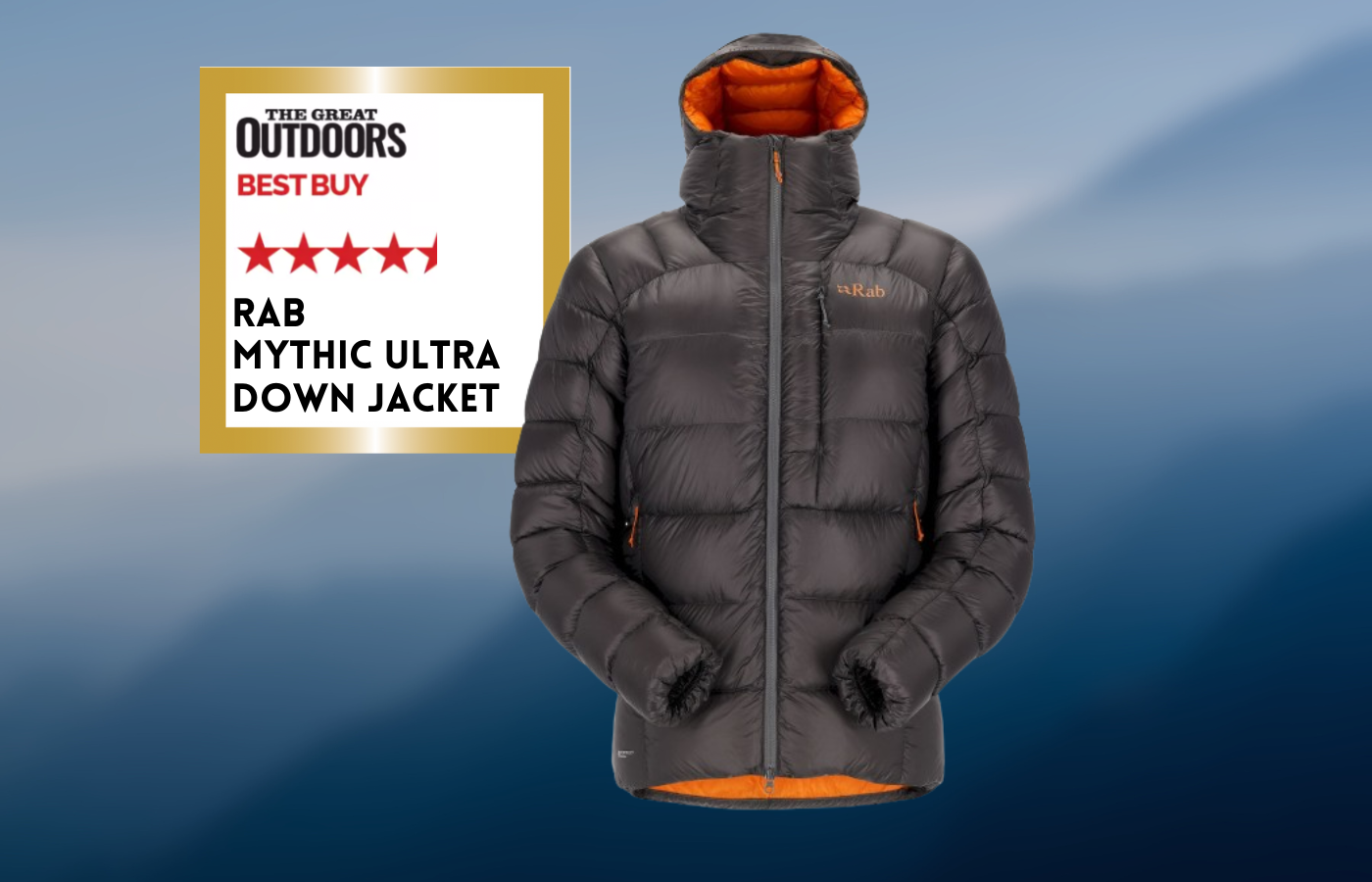
Alex Roddie’s Best in Test
The Mythic Ultra is perfect for multi-day backpacking in the coldest Scottish winter conditions.| Quick specs | |
|---|---|
| Price: £420 Weight: 497g (men’s medium) Pros: very warm for the weight, good hood, recycled fabrics Cons: potentially fragile face fabric Fill: 240g of 900fp European goose down, RDS-certified, with Nikwax PFC-free hydrophobic finish Shell: 100% recycled Pertex Quantum 10D nylon ripstop with PFC-free DWR; 100% recycled nylon lining Hood: stiffened peak, adjustment at sides Cuffs: elasticated Hem: drawcord with 2x adjusters Pockets: 2x handwarmer, 1x outer Sizes: S–XXL Womens/Mens version: both |
The Mythic Ultra is a lightweight, warm jacket that provides 240g of 900fp down for maximum insulation. It feels like a luxurious sleeping bag, even without a mid-layer. The jacket’s baffles are a mix of stitch-through and box-wall, and I found it windproof and durable during testing. However, the face fabric is only 10D, making it less windproof and durable than thicker fabrics tested.
The down is hydrophobic and the face fabric’s DWR works when new, making it weather-resistant. To protect the jacket, a hardshell should be layered over the top. The hood is good but it has no volume reducer and can only be adjusted at the sides, which made it vulnerable to high winds. The jacket has an average fit and good backside coverage.
The Mythic Ultra was ideal for multi-day backpacking in Scottish winter conditions, but should be treated with care due to its thin face fabric.
Read Alex Roddie’s full Rab Mythic Ultra Down Jacket Review
Montane Resolve XT Hooded Down Jacket
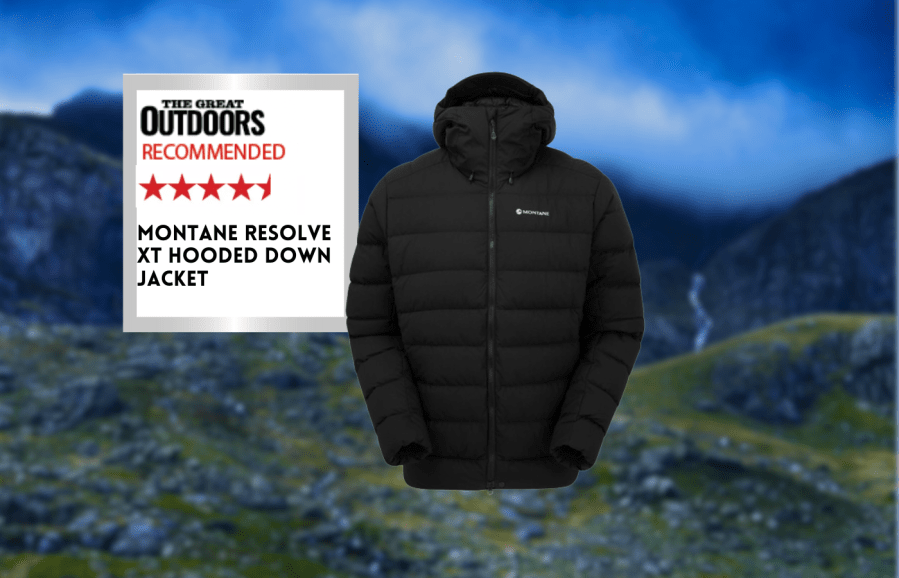
Alex Roddie Recommends
Overall, a great choice for British winter use: built to take the weather, warm enough for 90% of conditions, and at a competitive price.- Durable and weather-resistant face fabric
- Excellent hood
- Price
- Not as warm as other jackets
| Quick specs | |
|---|---|
| Stars: 4.5 Price: $450 | £350 Weight: 568g (men’s medium) Fill: 220g of 750fp RDS-certified duck down with HyperDRY PFC-free hydrophobic finish Shell: Gore-Tex Windstopper 30D nylon ripstop with PFC-free DWR; 100% recycled nylon lining Hood: stiffened peak, adjustment at sides and rear Cuffs: elasticated Hem: drawcord with 2x adjusters Pockets: 2x handwarmer, 1x inner Sizes: S–XXL Womens/Mens version: both |
The Montane Resolve XT is a versatile jacket with 220g of 750fp down, suitable for most winter conditions in British hills. It is ideal for a blowy December summit camp. I wore the jacket layered over a microfleece while erecting a tent in a blizzard. However, jackets with higher fill power down are warmer for the weight, and in cold conditions, a good mid-layer is needed.
The baffle design is stitch-through, this meant that I did find some cold spots. The burly 30D Windstopper face fabric shields the down from the elements and is hydrophobic, making it the most windproof and water-resistant of all tested jackets. The hood is excellent, with a good peak and three handy points of adjustment, making it suitable for both camp use and layering in filthy winter conditions.
The jacket has good coverage of the backside and doesn’t ride up under a pack. Sizing is average, but it is a great choice for British winter use.
Read Alex Roddie’s full Montane Resolve XT Hooded Down Jacket Review
Black Diamond Approach Down Hoody

Alex Roddie Recommends
This is very warm for the weight, I’ve found it best as a mid-layer in very cold winter conditions – or as an outer layer in less extreme weather.- Ultralight
- Excellent performance for weight
- High weather resistance
- Hood could be better
| Quick specs | |
|---|---|
| Price: £320 Weight: 303g Fill: 130g 800fp goose down, RDS-certified, with PFC-free hydrophobic finish Shell: 10D nylon ripstop with PFC-free DWR Hood: not wired, adjustment at rear Cuffs: elasticated Hem: drawcord with 1x adjuster Pockets: 1x outer chest (zipped), 2x handwarmer (zipped) Sizes: men & women: XS–XL Womens/Mens version: both blackdiamondequipment.com |
The Black Diamond Approach Down Hoody is a lightweight, top-quality Alpine-style jacket designed for fast-and-light mountaineering. It features RDS-certified 800fp down and hydrophobic treatment, with a thin 10D nylon face fabric bonded with EMPEL DWR technology. The jacket is rain-resistant and I found it to be a snug fit only allowing for a thin fleece underneath.
The hood is adjustable and provides adequate face coverage for an ultralight jacket. The jacket was very warm for its weight and is best used as a mid-layer in cold winter conditions or as an outer layer in less extreme weather. It’s ideal for wild camping in freezing or below temperatures.
Although not suitable for extensive use under a rucksack due to the thin 10D face fabric, it’s perfect for its intended use.
Read Alex Roddie’s full Black Diamond Approach Down Hoody Review
Fjällräven Expedition Pack Down Hoodie
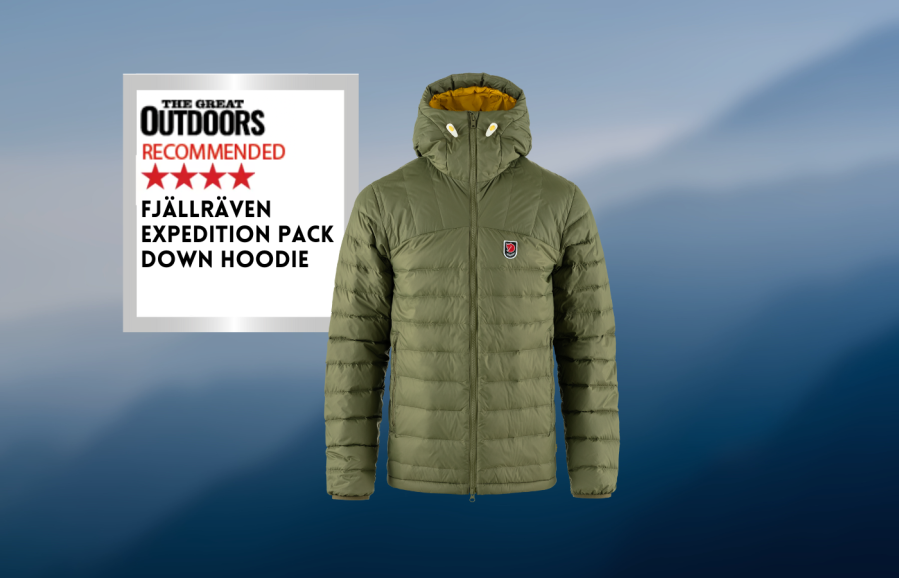
Alex Roddie Recommends
Higher-fill-power down would make the jacket warmer for the weight. However, this would also make it more expensive – and £315 is an attractive price.- Ethically sourced down
- Recycled materials
- Lightweight
- Good hood
- Down not hydrophobic
- Not the best warmth/weight ratio
| Quick specs | |
|---|---|
| Price: £315 Weight: 508g Fill: 110g 700fp traceable goose down, Fjällräven Down Promise Shell: 100% recycled polyamide Hood: not wired, adjustment at rear and sides Cuffs: elasticated Hem: drawcord with 2x adjusters Pockets: 1x inner chest (zipped), 2x handwarmer (zipped) Sizes: men: XS–XXL; women: XXS–XL Womens/Mens version: both fjallraven.com |
The Expedition Pack Down insulated jacket is a modern take on a classic Fjällräven design, When first putting on the jacket I found it was roomy and had broad stitch-through baffles. Inside the baffles are 110g of 700fp traceable goose down, backed by Fjällräven’s Down Promise. Although not RDS-certified, the down exceeds ethical certification in many respects.
The jacket has synthetic insulation in the shoulders for durability. The outer fabric is 100% recycled polyamide, which repels light precipitation for a short time. While not the most weather-resistant down jacket, I found it performed well in dry cold and provides excellent face coverage. The hood adjusts well and has excellent face coverage. A higher-fill-power down would make the jacket warmer but would also be more expensive.
Read Alex Roddie’s full Fjällräven Expedition Pack Down Hoodie Review
Arc’teryx Thorium SV Hoody
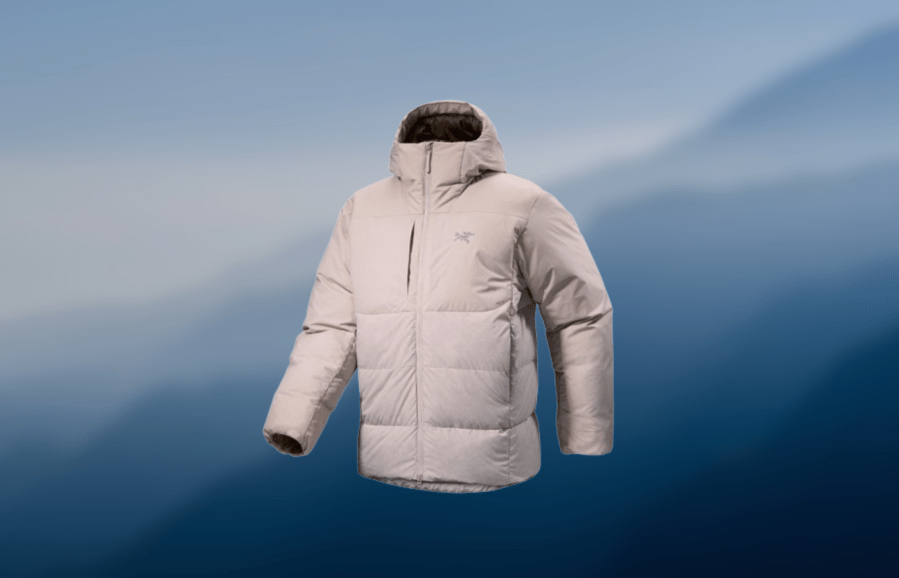
Alex Roddie’s verdict
The jacket is well-made and warm, but is more suitable for cold but dry environments without damping the down.- Very warm
- Roomy
- Good pockets
- Expensive
- Down not hydrophobic
- Basic hood
| Quick specs | |
|---|---|
| Price: $700 | £500 Weight: 656g (men’s medium) Fill: 750fp European grey goose down, RDS-certified; zoned Coreloft 140 and 80 synthetic insulation (80% recycled) Shell: 30D Arato nylon with Gore-Tex Infinium panels (PFC-free DWR) on hood/shoulders Hood: not wired, adjustment at rear Cuffs: elasticated. Hem: drawcord with 2x adjusters Pockets: 2x handwarmer, 2x inner, 2x outer Sizes: XS–XXL Womens/Mens version: both |
This jacket is made with box-wall baffles to reduce cold spots and is very warm, with 750fp down and zoned synthetic insulation. It feels just as warm as the Rab Mythic Ultra but is around 150g heavier and doesn’t compress as small.
The down is not hydrophobic, making it less resistant to moisture. However, clever design features like the 30D outer fabric, windproof Gore-Tex Infinium panels, and zoned synthetic insulation help mitigate this.
I thought the jacket tested well in short spells of light precipitation but lacks a stiffened peak and only has one adjustment point. The design is shorter than other jackets, with less backside coverage, which can lead to riding up under a rucksack.
The fit is more generous than other I have tested, and pockets are a strength, particularly the twin outer chest pockets and easy-to-use zip pulls with gloves. The Thorium SV is exceptionally well-made and very warm, but is more suited to cold but dry environments where there is no risk of the down getting damp.
Read Alex’ full Arc’teryx Thorium SV Hoody Review
Montane Icarus
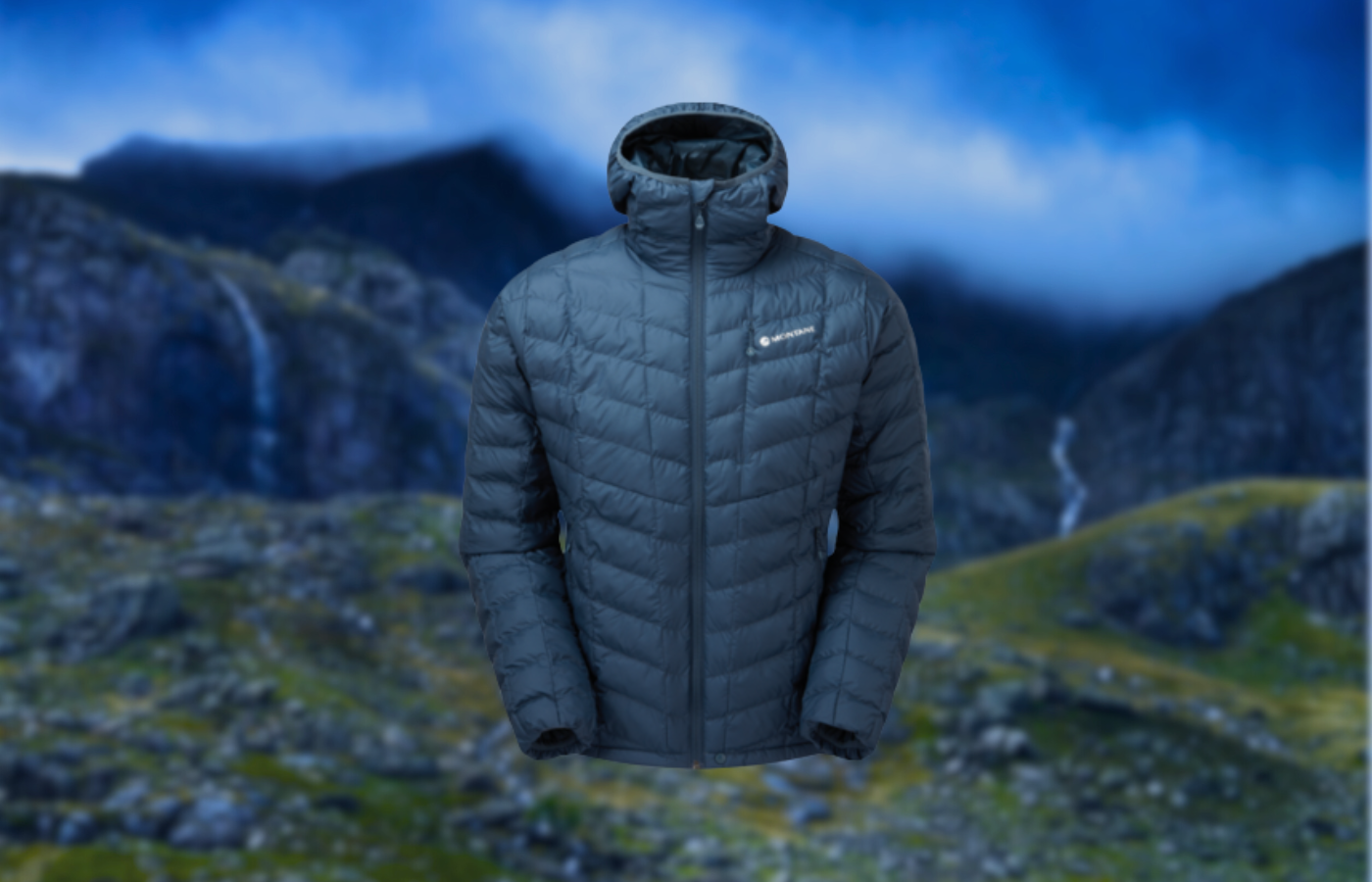
Chris Townsend’s verdict
As a winter jacket for rest stop/camp use and maybe walking in the worst conditions, the Montane Icarus would be ok. However, there are alternatives that weigh less and pack down smaller.- Warm
- Cost
- Recycled content
- Quite heavy
- Non-adjustable hood
| Quick specs | |
|---|---|
| Price: $209 | £150 Weight: 22.5 oz | 640g Materials: shell/lining, Pertex Quantum Eco 50% recycled/ 100% recycled PEAQ synthetic ECO; fill, 205g of PrimaLoft Black Thermoplume 100% recycled Features: stretch rim hood, handwarmer pockets, chest pocket Sizes: S-XXL Women’s version: no, but Phoenix Jacket is similar |
Chris Townsend say’s: The Montane Icarus is a lightweight, warm, and functional jacket that is ideal for mountain walking in mixed conditions. It weighs 640g (L) and features a stretch rim hood, handwarmer pockets, and a chest pocket. The jacket is made of Pertex Quantum Eco 50% recycled/100% recycled PEAQ synthetic ECO shell/lining, PrimaLoft Black Thermoplume 100% recycled fill, and is available in sizes S-XXL.
The Montane Icarus fill mimics down and is held in micro baffles, making it comfortable and soft. The hood is not adjustable but is close-fitting, and the handwarmer pockets are accessible.
The chest pocket is too small for a map but can hold a smartphone or GPS unit. However, there are alternatives that weigh less and pack down smaller.
Read Chris’ Montane Icarus review.
Berghaus Affine
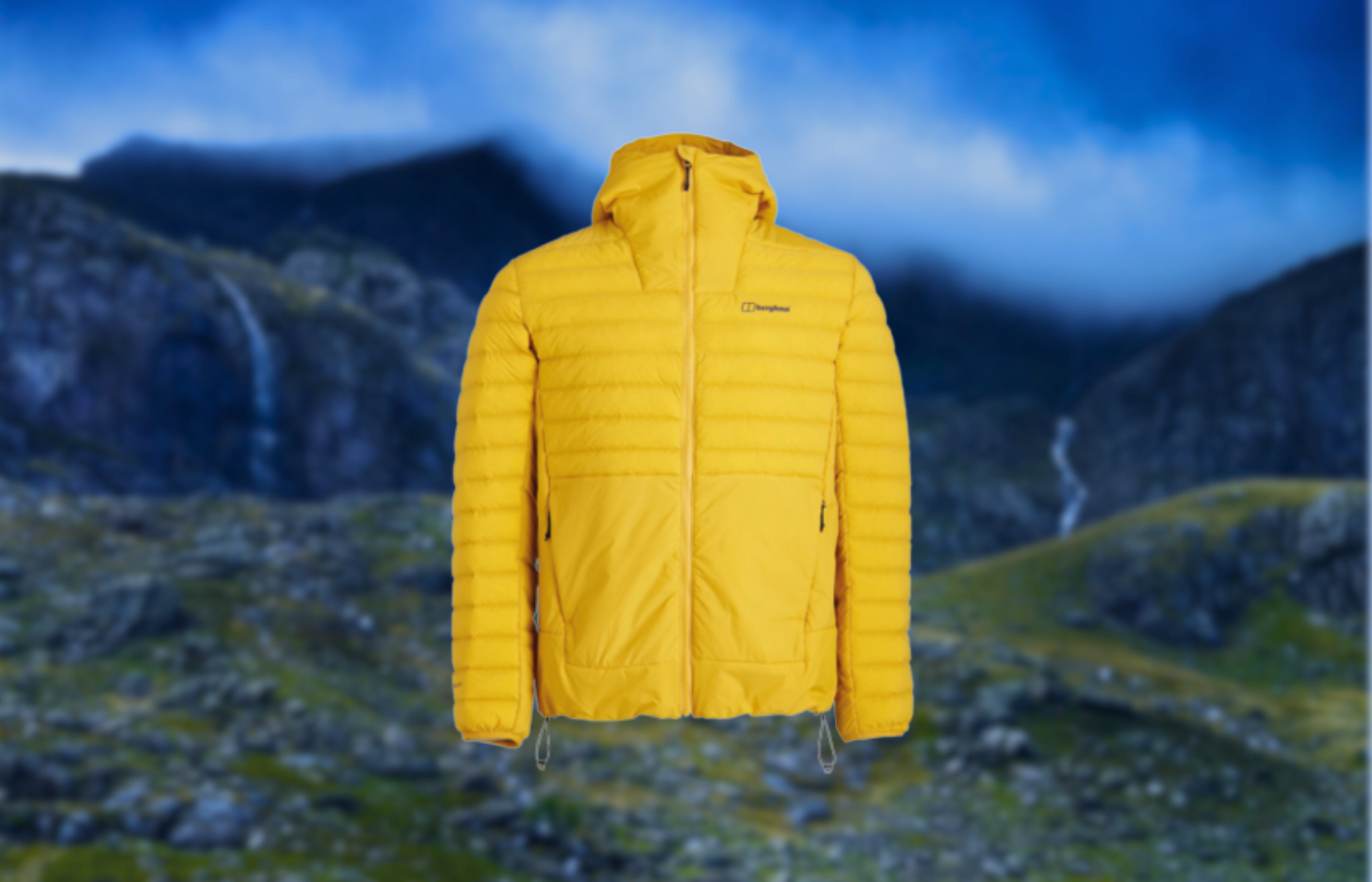
Chris Townsend’s verdict
Although expensive and not lightweight, the hood and stretch fabric make it worth considering.- Warm
- Stretchy
- Hood
- Stash pockets
- Not that light
| Quick specs | |
|---|---|
| Price: £200 | U.S. shipping charge Weight: 18.6 oz | 530g (L) Materials: shell: polyamide/13% elastane; fill: Hydroloft recycled polyester Features: adjustable hood with stiffened peak, handwarmer pockets, inner stuff pockets Sizes: XS-2XL Women’s version: yes |
Chris Townsend says: The Berghaus Affine is a synthetic insulated jacket with a stretch fabric that allows it to be close-fitting without being restrictive or uncomfortable. It has a small sizing and is suitable for wearing over a base layer.
The jacket is warm enough that it doesn’t need to be worn over anything more, especially in the UK. The Hydroloft fill is soft and lofts well. The jacket has an adjustable hood with a stiffened peak and is available in sizes XS-2XL.
The handwarmer pockets and inner stash pockets are useful for stuffing damp gloves. Although expensive and not lightweight, the hood and stretch fabric make it worth considering.
Read Chris’ Berghaus Affine review
Mountain Equipment Particle
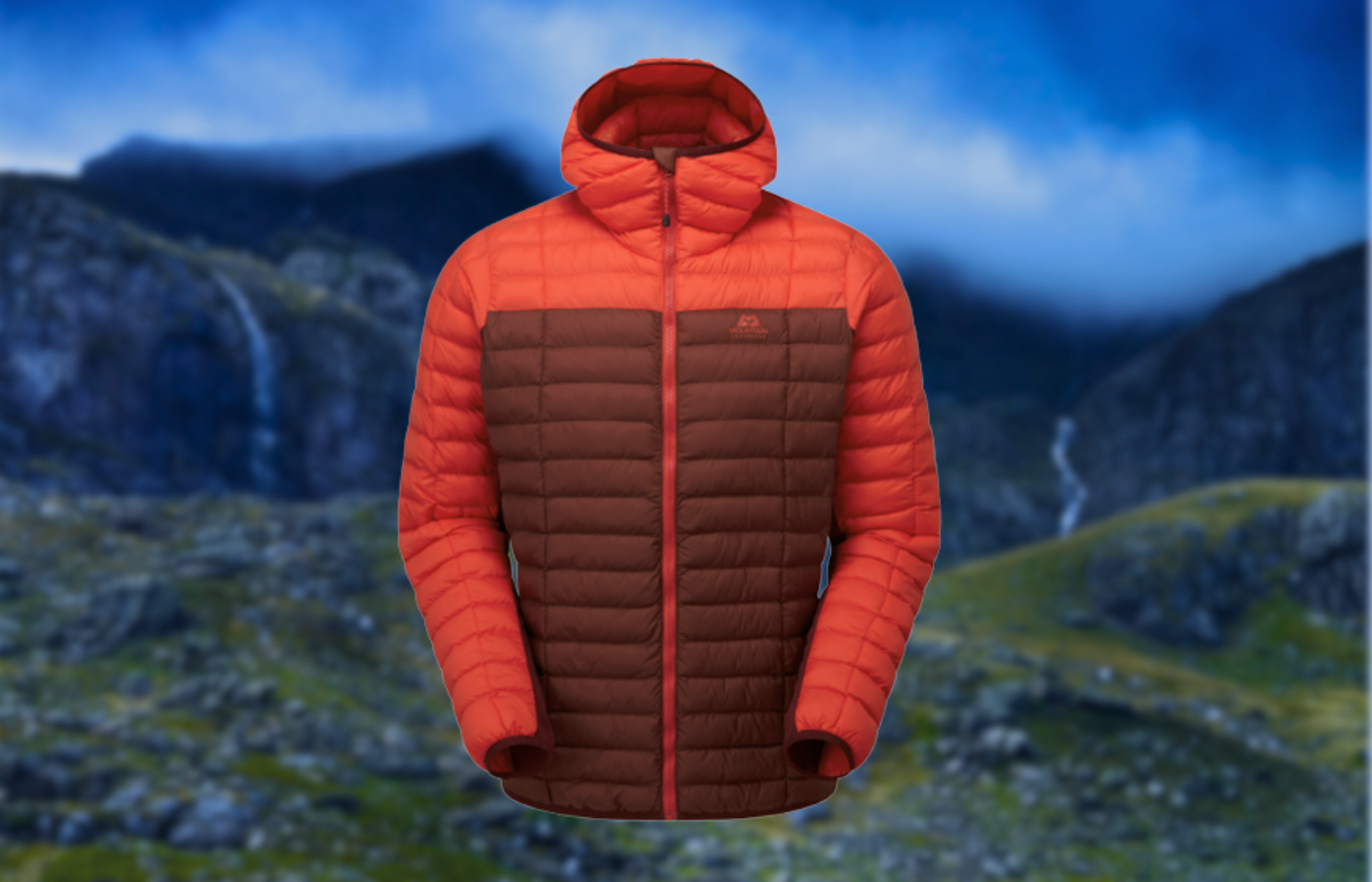
Chris Townsend’s verdict
While not a full-weight winter jacket, it is suitable for backpacking throughout the year.- Low weight
- Low cost
- Recycled fabric
- Non-adjustable hood
| Quick specs | |
|---|---|
| Price: $199 | £130 Weight: 14.4 oz | 410g (M) Materials: shell: recycled 20D, stretch fleece side and underarm panels; fill: 14.4 oz / 130 grams recycled Polarloft Features: stretch rim hood, handwarmer pockets Sizes: S-XXL Women’s version: yes |
Chris Townsend says: The Mountain Equipment Particle jacket is a lightweight, lightweight mid-layer or outer layer suitable for moderate conditions. It is lightweight and compact, making it ideal for backpacking or rest stops.
The jacket is made of recycled 20D shell, stretch fleece side and underarm panels, and 130 grams recycled Polarloft fill. It features a stretch rim hood and handwarmer pockets, and is available in sizes S-XXL.
The main shell fabric is windproof, but the fleece side and underarm panels are not. The jacket’s basic design is more suitable for a mid layer than an outer layer, with a non-adjustable hood and handwarmer pockets. While not a full-weight winter jacket, it is suitable for backpacking throughout the year.
Read Chris’ full Mountain Equipment Particle review.
Rab Xenair Alpine
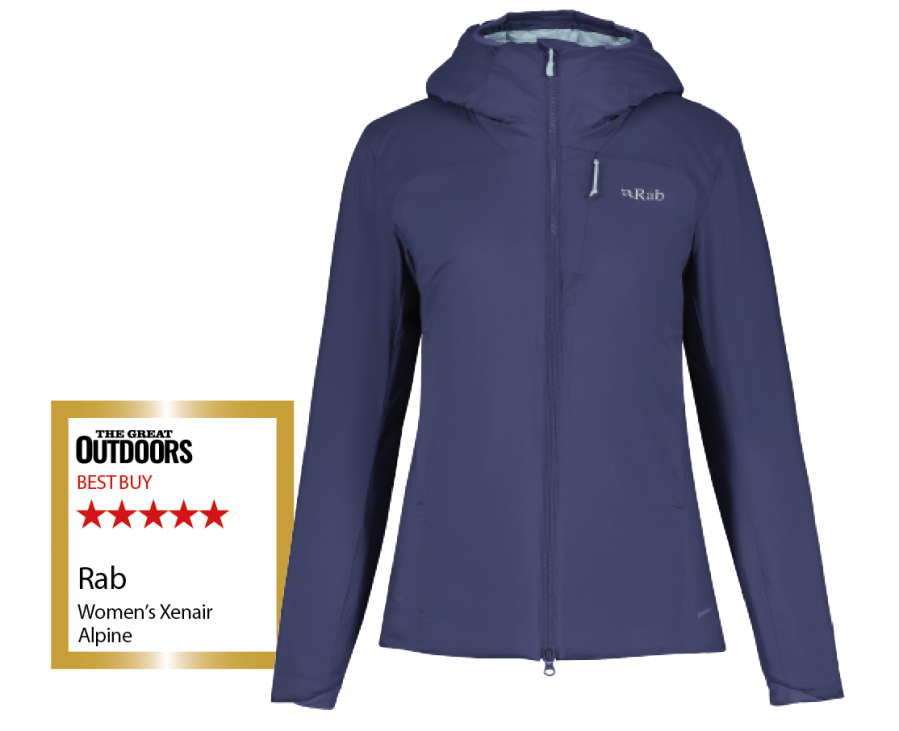
Lucy Wallace’s Best in Test
If I was to be really picky, I’d like one of these to be big enough for me to stuff the jacket into, but that really is the only negative point in an otherwise perfect garment.- Great all rounder
- None
| Quick specs | |
|---|---|
| Price: $240 £195 Weight: 14.8 oz | 420g (Size 12) Materials: shell: 20D Pertex Quantum Air; lining: 20D Atmos Ripstop; Fill: Primaloft Gold Active+ 55% recycled Features: helmet-compatible hood, handwarmer pockets, chest pocket, zone insulation (100/80gsm) Sizes: 8-16 Men’s version: yes |
Lucy Wallace says: It’s hard to find fault with the RAB Xenair Alpine, what sets it apart is the varying insulation depth within zoned areas, which enhances its performance and makes it ideal for stop-start cold weather activities.
One of the standout features is the helmet-compatible hood, complete with a drawcord that allows you to snugly cinch it in when facing high winds. Additionally, the inclusion of two-way zips provides easy access to a climbing harness, a crucial feature for those who engage in climbing or similar activities. And to top it off, there are two generously-sized handwarmer pockets that add to the practicality and convenience of this jacket. It’s a versatile choice for outdoor enthusiasts seeking both warmth and functionality.
Read Lucy’s full Rab Women’s Xenair Alpine review.
Montane Fireball Jacket
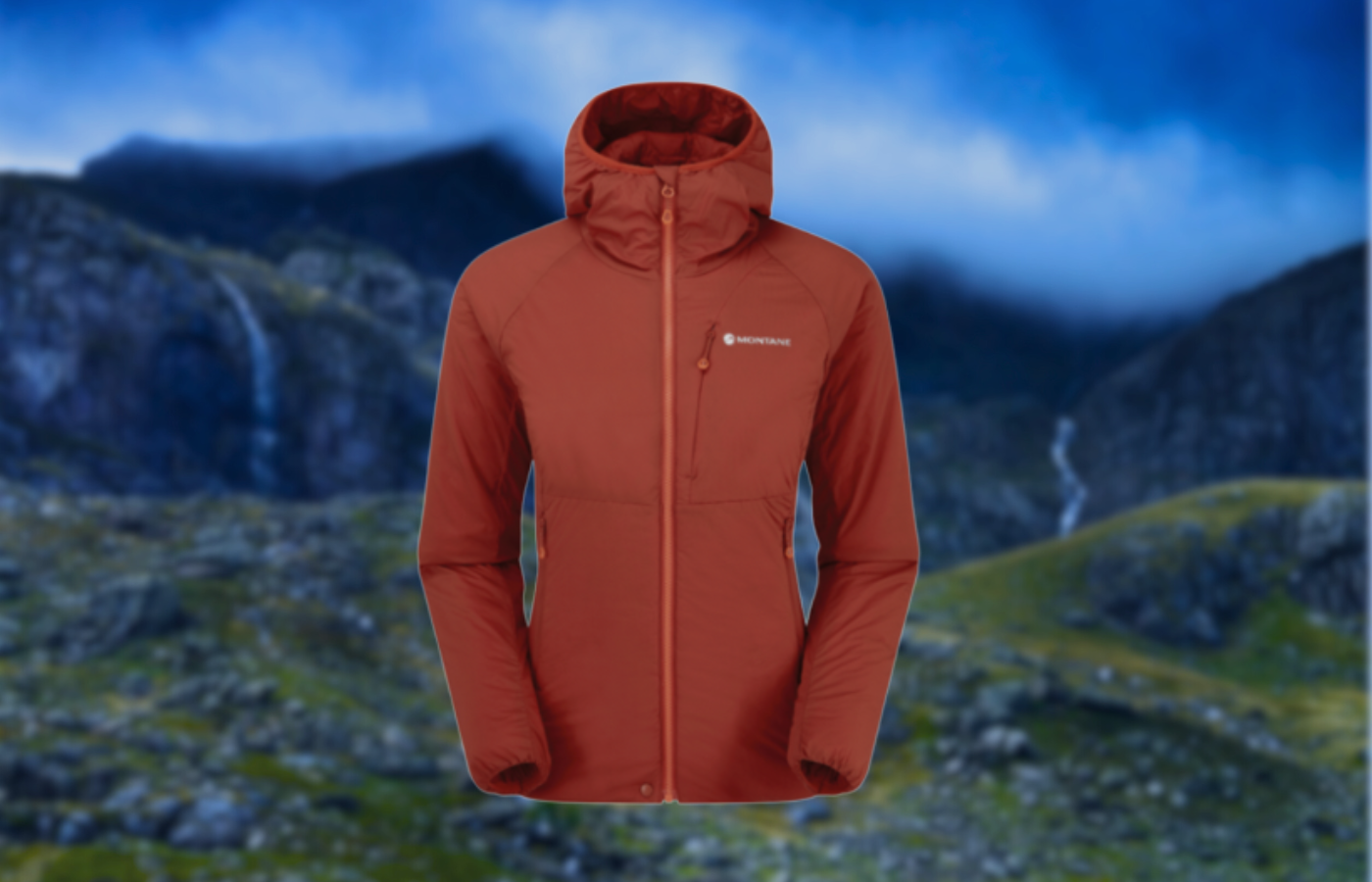
Lucy Wallace’s verdict
The Montane Women’s Fireball Jacket comes into its own either as a midlayer in winter, or a spare emergency layer in summer conditions.- Ligthweight
- Great for year round use
- Not very warm
| Quick specs | |
|---|---|
| Price: $299 | £200 Weight: 12.9 oz | 366g ( Size 12) Materials: shell: Featherlite Air nylon stretch; Fill: 55% recycled 60gsm Clo Vivo Extreme Eco Features: Hood, zipped handwarmer and chest pockets, elasticated cuffs Sizes: 8-16 Men’s version: yes |
Lucy Wallace says: The Fireball, one of the lighter insulated jackets in this test, proves to be a versatile choice. It can serve as a winter midlayer or an emergency layer during the summer. However, it’s worth noting that the non-adjustable hood makes it more suitable to be worn under helmets rather than over them. Another limitation is the absence of a two-way zip, which might require climbers to tuck the jacket into their harness for convenience.
Described as having an “active fit,” the sizing was actually found to be quite generous during testing. This added roominess can be advantageous for layering or accommodating various body shapes. Furthermore, the shell and insulation exhibit good stretch, enhancing overall comfort and mobility.
Read Lucy’s full Montane Women’s Fireball Jacket review.
Keela Talus
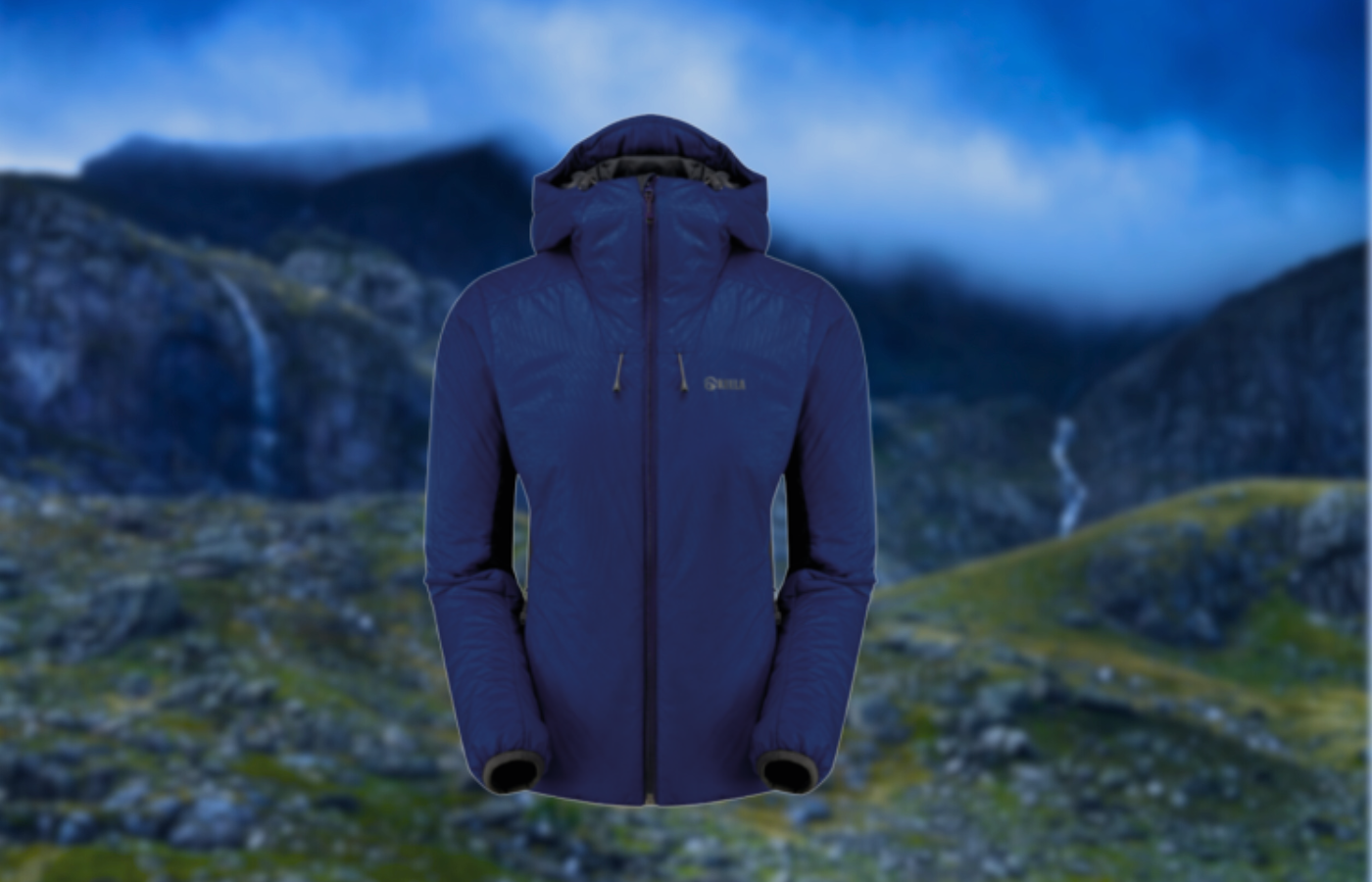
Lucy Wallace’s verdict
I didn’t get the chance to test the Keela Women’s Talus Jacket in really cold conditions. However, I think it will come into its own as an active, all-day layer for walking in very cold, dry winter.- Wired brim on hood
- Price
- Bulk
| Quick specs | |
|---|---|
| Price: £145 | International shipping charges apply Weight: 17.5 oz | 497g Materials: shell: Flylite Ultra ripstop nylon, side panels; 49%/40%/11% polyester/nylon/Lycra mix; Fill: 60gsm Primaloft Gold Features: helmet-compatible hood, zipped handwarmer and internal chest pockets, stretch fleece side panels Sizes: 8-20 Men’s version: Yes |
Lucy Wallace says: This insulated jacket is a versatile choice designed to meet your needs all year round. While it might not provide the same level of warmth as jackets with heavier insulation like the 100/80gsm in the Rab Xenair Alpine, the 60gsm Primaloft Gold in the body still offers very effective insulation.
The inclusion of a helmet-compatible hood is a valuable feature, ensuring good protection from the elements when needed. If you plan to use this jacket as an emergency layer or a belay jacket, it’s advisable to size up to ensure there’s enough room underneath for additional layers.
Read Lucy’s full Keela Women’s Talus Jacket review
Mountain Hardwear Ozonic Insulated Jacket
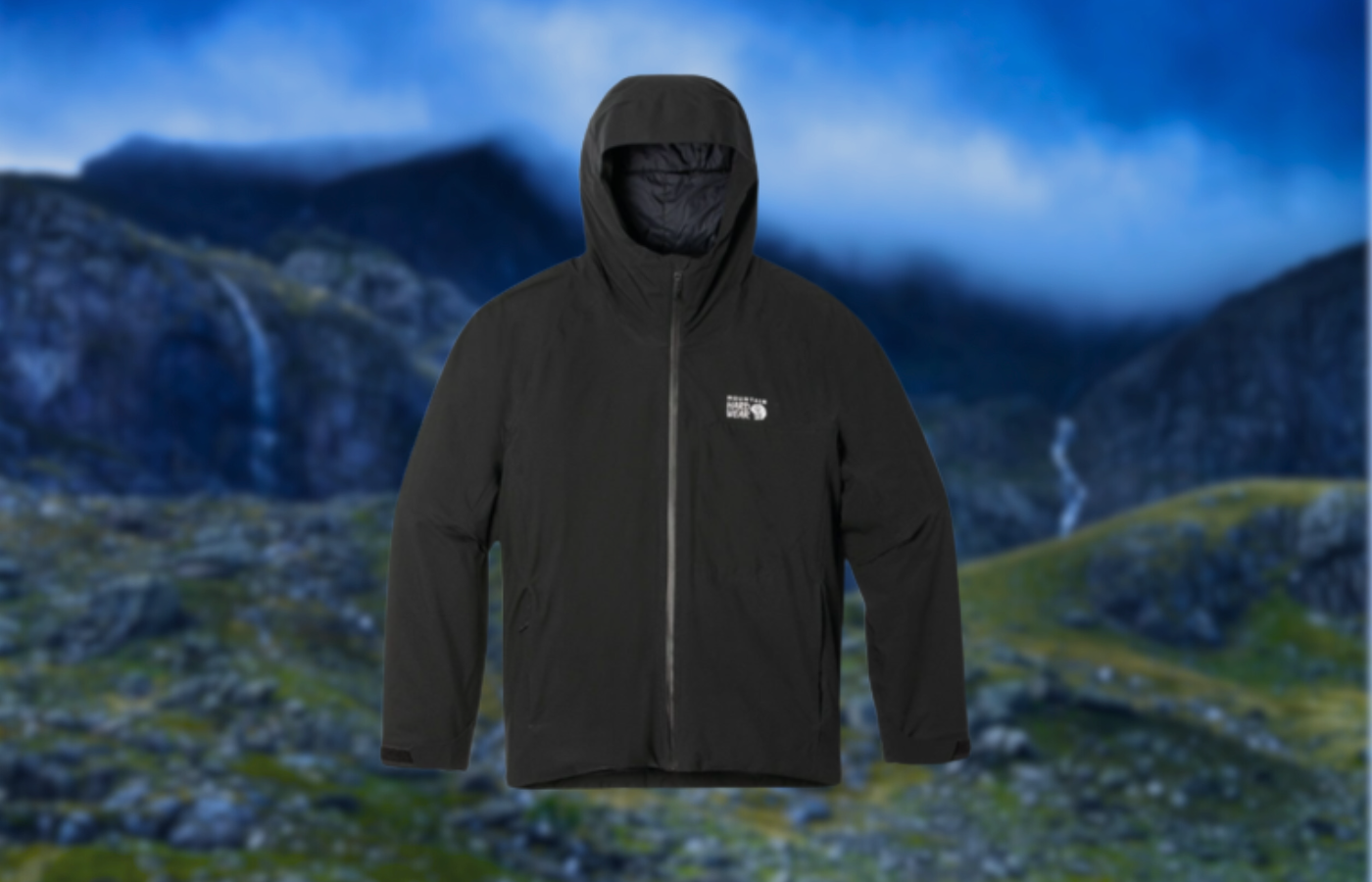
Lucy Wallace’s verdict
In its Alpine habitat, the Ozonic is a good, practical choice with the warmth and ease of layering that is needed for that environment.- Very Warm
- Expensive
- Bulky
| Quick specs | |
|---|---|
| Price: $250 | £250 Weight: 21.6 oz | 615g (Size M) Materials: shell: 50D stretch ripstop Pertex quantum air; Fill: 120gsm stretch Primaloft Gold Active Features: helmet-compatible hood, zipped handwarmer and internal chest pockets, internal drop pocket, under arm vents Sizes: XS-XL Men’s version: yes |
Lucy Wallace says: The Mountain Hardwear Ozonic Insulated Jacket is a versatile and lightweight option for snow sports enthusiasts. It features stretch fabric, providing freedom of movement, and is made of 50D stretch ripstop Pertex quantum air shell and 120gsm stretch Primaloft Gold Active fill.
The jacket is available in sizes XS-XL and has underarm vents for improved breathability. The hood is roomy and fits over a helmet, and the cuffs have Velcro tabs for protection. The jacket is designed for cold and dry conditions, but is bulky and not suitable for general mountain use in the UK.
However, it is a practical choice for wildlife guides, as it provides warmth and ease of layering in their Alpine habitat. The price ranges from $250 to £250, making it a cost-effective choice for those seeking a warm and practical choice for their outdoor activities.
Read our full Ozonic Insulated Jacket review.
Sprayway Misten
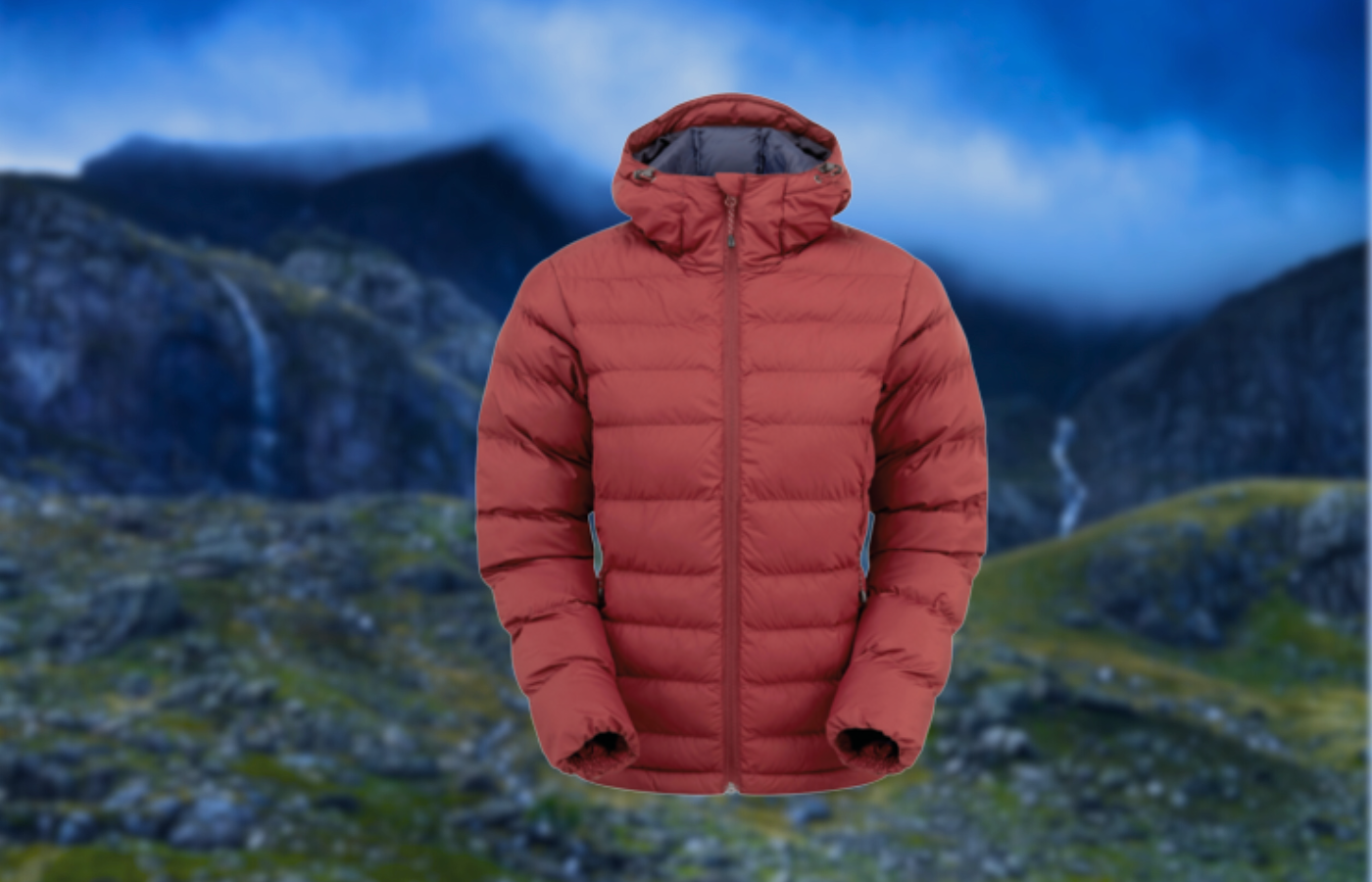
Lucy Wallace’s verdict
At £140, it is the lowest-priced jacket in our guide to the best synthetic insulated jackets, making it a great choice for those looking for a budget-friendly option.- Warm
- Lower price
- Heavy
- Stich through baffles
| Quick specs | |
|---|---|
| Price: £140 | No U.S. shipping Weight: 363g Materials: shell: 100% recycled polyester lining: 1005 polyamide; fill: 100% polyester Insofill blown insulation Features: adjustable wired hood, zipped handwarmer pockets, internal chest pocket, elasticated cuffs Sizes: 8-20 Men’s version: yes |
Lucy Wallace says: The Sprayway Misten Jacket is a synthetic insulated jacket with a ‘blown fill’, where synthetic fibres are blown rather than spun to mimic natural down. It weighs 363g and is made of 100% recycled polyester shell and 1005 polyamide lining. The jacket features an adjustable wired hood, zipped handwarmer pockets, internal chest pocket, and elasticated cuffs.
Although it requires sewn baffles to hold the fill in place, it is sufficient for warmth and performance in cold conditions. The jacket is bulky for rucksack packing but is suitable for belay or emergency layer. It is suitable for slower-paced activities or camp. At £140, it is the lowest-priced jacket in our guide to the best synthetic insulated jackets, making it a great choice for those looking for a budget-friendly option.
See our full thoughts in the Sprayway Misten Jacket review
A guide to synthetic insulation
Synthetic insulation is usually made up of sheets of fibres and the thickness or density of these, and hence the warmth, is measured in grams per square metre (gsm). Alternatively, it may be ‘blown clusters’ that mimic the structure and ‘loft’ (fluffiness) of down, requiring baffles to hold them in place; for this the overall fill weight is quantified. Synthetic fill has good ethical credentials, being vegan and cruelty-free by default, but it may contribute to microfibre pollution if the fibres escape. You can reduce the environmental footprint by choosing products with recycled content.
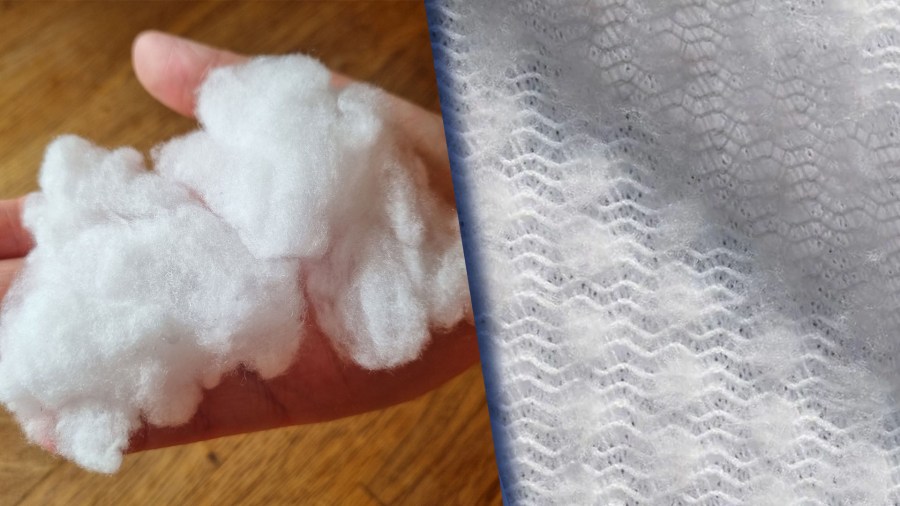
Whilst insulated garments are great for throwing on for a breezy snack stop, a cold summit or a camp, many are light and breathable enough to form part of layering system, including underneath a waterproof jacket, and could conceivably be worn on the go in cold temperatures. The bigger, chunkier jackets are typically too warm to wear on the go, but are heaven on cold belay stances or winter camps – i.e. when you’re stationary for a long time.
Synthetic puffy jackets are simple to clean, and dry quickly, making them easy to maintain. There’s an argument for carrying one in your hiking backpack all year round.
How we test
Lucy Wallace
Lucy has tested the women’s synthetic insulated jackets over a varied mix of spring and summer conditions, with mountain camps and cold summit temperatures early in the testing period. Towards the end of the period things got a little heated but cooler conditions were found when heading into the hills at night. Lucy is a professional wildlife guide and outdoor instructor who holds the Winter, Summer and International Mountain Leader awards. She is an accredited Duke of Edinburgh’s Award assessor, working with schools and young people on expeditions throughout Scotland.
Chris Townsend
Chris Townsend tested the men’s jackets over a varied mix of winter, spring and summer weather, with cold summit temperatures early in the testing period. Towards the end of the period cool conditions were found when camping high in the hills. Chis has been our Gear Editor since 1991, Chris Townsend is one of the world’s most highly respected commentators on outdoor clothing and equipment and is also well-known as an author and long-distance hiker. He is the award-winning author of 22 books, including The Backpackers’ Handbook, the Cicerone guide to walking in Scotland and Out There, a recent collection of essays.
Kirsty Pallas
Kirsty Pallas is a size 8 with a short back and arms. These jackets have been tested across Scotland from last winter, through spring and summer in all conditions. They were used as extra layers for summer stops and camping, and active layers for winter skills and winter climbing. Weights are taken from her own scales.
David Lintern
David Lintern takes a size medium in tops and has arms on the longish side, relative to a short back. Most of these jackets have been in regular use since last winter, right across Scotland in all weathers, both on the move and at camp. He tends to run warm and values garments that can be left on all day.
Alex Roddie
Alex tested his down jackets on a series of short backpacking trips in the Cairngorms and West Highlands during a spell of cold and snowy weather in November and December. The jackets were used both in camp and while hiking. All weights are as measured on Alex’s digital scale.
What makes a good synthetic insulated jacket
Fill
Primaloft is the big name in synthetic insulation; but there are other excellent ones, and all those reviewed are good quality. With the latest types are lighter, more compressible and more durable than previous ones. Whatever the fill, it’s still true that the higher it lofts the warmer it is.
Shell fabrics
Thin synthetic shell fabrics are surprisingly tough, windproof, breathable and fast-drying. When new they’re usually quite water-resistant too, due to a DWR treatment. This comes in handy when scrambling or climbing thicker fabrics are more abrasion-resistant.
Pockets
Insulated handwarmer pockets are a boon on a chilly day. Ones that lie above a pack hip belt are best for use whilst walking. Chest pockets for map or smartphone/GPS are worth having. There are roomy pockets big enough to stuff hats and gloves in when you take them off, so they stay warm, and you don’t lose them, are useful too. Inner stash pockets are good for the same reason.
Hoods
Hoods aren’t essential but they are nice when the wind picks up, and a good substitute for a warm hat. Some hoods are designed for stormy weather and are adjustable, so they’ll stay on in strong winds. Simple hoods with just an elasticated rim can blow off in powerful gusts.
Size
Sizing varies between makes, so take it as a guide only. Some of the men’s Large jackets tested are smaller than some of the Mediums. Think about what you’ll wear under a jacket. If you might want to pull it on over all your other clothes including your waterproof jacket, then you may need a larger size than usual.

